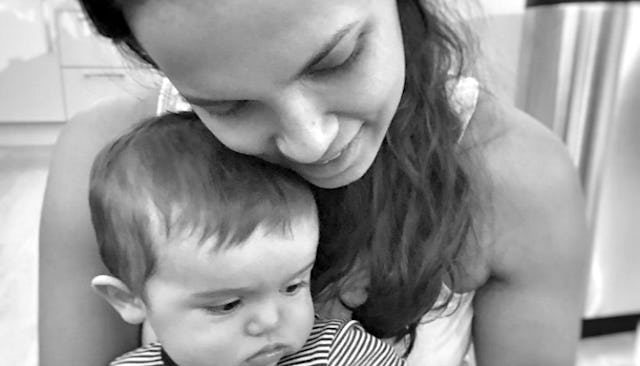We Need To Talk About Postpartum Health Anxiety

As the new year begins, I reflect over the past year with fondness, nostalgia, and regret. Last year was one of the most rewarding yet challenging years of my life. It was the best year yet the most fearful. Becoming a mother has filled my heart with love that I never knew I was capable of and at the same time a fear that seemed to consume me.
I didn’t understand what was happening at the start, and it began gradually. I was happy, completely happy with our new family and besotted with this gorgeous bundle we had made. I loved being a mom. Sure, it was tiring and demanding, but I loved every minute of it. I wanted time to slow down so I could really cherish every single moment I had with my baby who I knew would grow up too fast. So when a nurse breached the subject of postpartum depression, I shot it down straight away. I wasn’t depressed — I was over the moon!
Kylie Abreu
It started with little intruding thoughts here and there: “What if I fell down the stairs with the baby while my fiancé is away on business?” and “What if another car hit me while I was driving with the baby in the car?” but I managed to shrug them off until about three months postpartum when I started getting joint pain. I first had a little pain in one knee, then my fingers started clicking, until one morning I woke to find my thumb and forefingers were all bent and stiff.
After a trip to the doctor, I was referred to a rheumatologist, and that is when it all began. I became a Google doctor, googling my symptoms every moment I could, to the point my fiancé begged me to hand over my phone and computer. By the time I actually saw the rheumatologist, I had convinced myself I had an autoimmune disease and was going to die or be permanently disabled. Fortunately the rheumatologist confirmed that I have nothing of the sort and that it is common for women to experience joint pain after pregnancy.
My relief was only short-lived as I couldn’t accept that was the answer. What if I had something horrible and they were missing it? My constant googling and paranoia started to take control of my life. Any symptom I felt, I would google it. In one afternoon, I had googled over 10 different cancers and was fearful that I might have one of them. My breaking point was when I was taken to hospital in Australia for abdominal pain and was told I had a cyst on my right ovary. Unfortunately for me, I was first told by a student doctor who had no idea what she was saying, whose uncertainty and elusiveness sent me into a panicked crying fit.
I pleaded with God and life to not let this happen, that I had a baby who needed me and that I didn’t want to die. Since the death of my father when I was young, I had always wanted a family of my own to fill the void. Now I finally had my family, and I was finally happy. I begged to God: Please do not take this away from me.
So when the senior doctor came in and explained that the cyst was benign and was most likely caused by endometriosis, he shone a light and made me see that I had a problem. My brief outburst had brought up feelings that I didn’t realize I still had. It made me face the fact that I still had issues concerning my dad’s passing. My fear of missing out on my son’s life is rooted in the sadness that my dad is missing out on mine — that he will never be able to meet his grandchild, that he won’t be here to walk me down the aisle.
Kylie Abreu
When I got home, I looked up postpartum depression and found postpartum health anxiety. I was shocked to see that I was not the only one. It is a very common part of postpartum anxiety that is not often talked about. Women all over the world were feeling the exact same way as me, whether they had lost a parent or not, and were in need of help. As I read all the stories of all these different mothers I felt relief and sadness. Relief that I was not the only one and that with help I could address my issues. Sadness at seeing so many others suffer and torment themselves all because there is not enough education on this subject.
There is a stigma regarding postpartum depression and anxiety which needs to be addressed. Women need to know that no matter how strong, independent, and good a mother you are, you can also experience a form of postpartum depression and there is nothing wrong with that.
I falsely believed that because I was not having difficulty bonding with my baby, and did not experience sadness, I didn’t suffer from postpartum depression. We give up our bodies, lives, and sometimes our sanity for our babies. It takes time and patience to bounce back.We need to learn to admit that having a baby is hard and does take a toll on us without feeling like a failure and that it is okay to ask for help. I am the poster child for not asking for help.
If you are experiencing postpartum depression or anxiety, please speak up and let other women know they are not alone. It was difficult for me to write this and share with you all, but if I can help just one person by writing this and encouraging others to tell their story, then it is worth it.
If you think you might be suffering from PPD, or need some extra support, visit www.postpartumprogress.com.